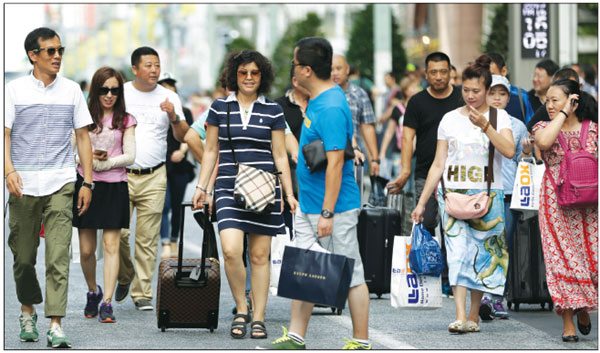Dark clouds over tourism 'dissipating'Industry experts see stronger yen and regional
Updated: 2016-08-10 07:34
By Chai Hua in Shenzhen(China Daily)
|
|||||||||
currencies luring back more visitors Industry experts see stronger yen and regional currencies luring back more visitors
Hong Kong's battered tourism sector, notably hard hit retailers, may finally breathe a sigh of relief as a soaring Japanese yen and other appreciating regional currencies are likely to put a stopper on Chinese mainland travelers to other Asian destinations and bring them back to Hong Kong.
Industry experts say recent strong currency fluctuations in neighboring economies may force mainland tourists to change their travel behavior.
Hong Kong's tourism-related businesses have been teetering on the brink for the past two years as mainland tourists made a beeline for Japanese shores, taking advantage of a sharp depreciation in the yen against the yuan.
According to the Japan Tourism Agency, the number of mainland visitors to Japan almost doubled and their traveling expenses rose by 20 percent last year alone.
The backlash has been hard on Hong Kong, which saw the number of mainland visitors to the city heading south for nearly a year since mid-2015, casting a pall over the SAR's retail operations.
However, the situation is expected to improve as the Japanese yen makes a U-turn, raking up sharp gains against major currencies since early this year. In the first half of 2016, the yen had soared about 30 percent against the yuan - one yuan is currently worth only about 15 yen, compared with 19 yen earlier this year.
Christiaan Tuntono, an economist at Credit Suisse, said other regional and global currencies have also picked up, and more mainland tourists could be returning to Hong Kong.
He believes the big discounts mainland shoppers had been enjoying in Japanese malls have now narrowed, benefitting Hong Kong in the process.
According to Hong Kong's Secretary for Commerce and Economic Development Gregory So Kam-leung, the number of mainland tourists to the SAR had surged 3.5 percent in the first half of July this year.
Liu Ke, marketing director of China International Travel Service in Shenzhen, told China Daily that although trips made by mainland tourists to Japan are still on the rise, they have been losing momentum since the beginning of this month.
He said mainland travelers, particularly those from Shenzhen and neighboring cities, are now heading back to Hong Kong.
Wang Yi, a Shenzhen-based analyst of Ctrip - one of the country's biggest online travel agencies - believes that while the yen's appreciation has had a limited impact on Chinese tourists in recent months, it has brought about a change in their traveling pattern and behavior - from saving up travel costs and spending more on food to making their trips more comfortable.
She said, in fact, mainland travelers' expenditure on food, accommodation and tourist sites in Japan had surpassed that on goods in the first half of 2016.
In her view, Hong Kong's tourism market has seen signs of recovery so far this month, helped by the summer vacation.
But, the SAR's retail sector has continued to fall for 16 consecutive months, with retail sales in June having slipped 8.9 percent from a year earlier to HK$33.7 billion in value terms - larger than the 8.3-percent slump in May.
Xu Tong, a Shenzhen white-collar worker who went on a tour of Japan in May, said she spent the bulk of her 10,000-yuan ($1,500) budget on hot springs or trying out the traditional kimono costume, and forked out just 2,000 yuan on cosmetics and souvenirs.
She travels to Hong Kong monthly, mainly for hiking and sightseeing, but shopping malls and major tourist attractions are not her cup of tea.
grace@chinadailyhk.com
|
Chinese mainland tourists on a shopping spree in Tokyo's famed Ginza district. Experts say a change in mainland visitors' traveling pattern and behavior is seen recently - their expenditure on food, accommodation and tourist sites in Japan had surpassed that on goods in the fi rst half of 2016. Kiyoshi Ota / Bloomberg |
(China Daily 08/10/2016 page10)
